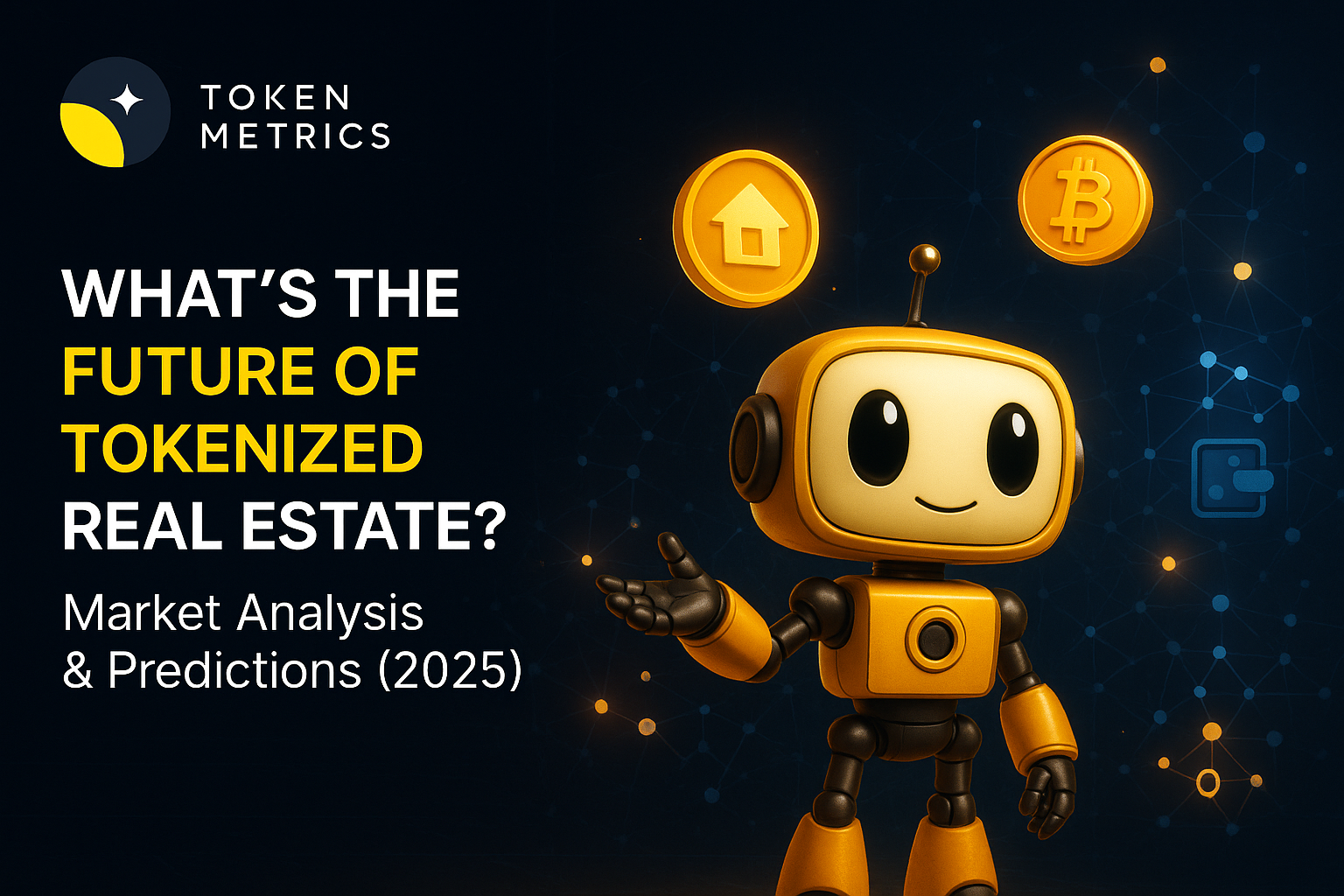What's the Future of Tokenized Real Estate? Market Analysis & Predictions (2025)

The real estate industry is on the cusp of a transformative revolution, arguably the most significant since the advent of Real Estate Investment Trusts (REITs). At the heart of this change is tokenized real estate—an innovative approach that converts physical property ownership into blockchain-based digital tokens. This breakthrough is reshaping how investors access, trade, and profit from one of the largest asset classes globally. With projections indicating that the tokenized real estate market could surge from $3.5 billion in 2024 to an astounding $4 trillion by 2035, understanding what's the future of tokenized real estate is essential for investors seeking to stay ahead in the evolving landscape of property investment.
The Explosive Growth Trajectory
The growth trajectory of tokenized real estate is nothing short of remarkable. Industry analyses forecast that the global real estate tokenization market will expand at a compound annual growth rate (CAGR) of 21% from 2024 through 2033, climbing from $3.5 billion to $19.4 billion within that period. Even more optimistic projections by Deloitte suggest this market could reach $4 trillion by 2035, reflecting a CAGR of 27%. By 2030, tokenized real estate is expected to account for approximately 15% of all real estate assets under management worldwide. Far from being a niche experiment, tokenized real estate is rapidly becoming a mainstream investment vehicle. This growth is democratizing access to real estate—a sector traditionally dominated by high net worth individuals and institutional investors—by enabling broader participation through digital tokens and fractional ownership.
Why Tokenization Is Reshaping Real Estate Investment
Breaking Down Barriers to Entry
Traditional real estate investment has long been characterized by substantial capital requirements, illiquidity, and complex transaction processes. These factors have often excluded retail investors and smaller participants from meaningful property ownership. However, real estate tokenization platforms are radically altering this dynamic by enabling investors to buy fractional ownership in rental properties and commercial space with minimal capital—sometimes as low as $50.
This fractional ownership model empowers investors to diversify their real estate portfolios across multiple properties, geographic regions, and asset classes without the traditional burden of substantial minimum investment requirements. Instead of concentrating substantial capital in one or two physical assets, investors can now build balanced real estate portfolios, mitigating risk and enhancing potential returns.
Solving the Liquidity Problem
One of the most significant challenges in traditional property investment has been illiquidity. Selling physical property often involves lengthy processes, high transaction costs, and regulatory hurdles, making real estate a relatively illiquid asset class. Tokenized real estate addresses this by transforming property ownership into digital tokens that can be traded on secondary markets.
Though liquidity in tokenized real estate is still maturing compared to traditional financial instruments, platforms such as RealT and Lofty have pioneered 24/7 secondary market trading for tokenized properties. This development provides investors with unprecedented flexibility, allowing them to buy and sell fractional real estate interests more efficiently and with reduced transaction costs.
Operational Efficiency and Cost Reduction
Tokenization leverages blockchain technology and smart contracts to streamline the operational aspects of real estate investing. By automating processes such as dividend distributions, ownership transfers, and compliance checks, tokenization reduces reliance on intermediaries like brokers and escrow agents. This automation not only cuts administrative expenses but also expedites settlement times, enhancing overall market efficiency.
Smart contracts—self-executing agreements encoded on the blockchain—play a critical role in this transformation. They ensure transparency, enforce contractual terms automatically, and minimize human error, thereby fostering greater trust and reducing the risk of disputes in property transactions.
Institutional Adoption Drives Mainstream Acceptance
The transition of tokenized real estate from an experimental concept to mainstream investment is being propelled by significant institutional adoption. As of mid-2024, approximately 12% of real estate firms globally have integrated tokenization solutions into their operations, while another 46% are actively piloting such programs. This widespread interest signals a growing commitment by major financial institutions, asset managers, and real estate firms to embrace tokenization infrastructure.
Investor sentiment further underscores this trend, with projections indicating that institutional investors may allocate between 7% and 9% of their portfolios to tokenized assets by 2027. Notable initiatives, such as Kin Capital’s $100 million real estate debt fund launched on blockchain platforms, demonstrate that tokenized real estate is expanding beyond residential properties into commercial real estate and sophisticated financial instruments.
The Technology Infrastructure Evolving Rapidly
Platform Proliferation
The technological backbone supporting tokenized real estate is evolving at a rapid pace. In 2023 alone, the number of real estate tokenization platforms worldwide surged by 75%, reflecting growing demand and innovation. Various blockchain networks—including Ethereum, Solana, Tezos, and specialized real estate blockchains—are competing to become the preferred infrastructure for asset tokenization.
These platforms not only facilitate the creation and management of digital tokens representing real estate assets but also provide tools for investor onboarding, compliance, and secondary market trading, enhancing both accessibility and security.
Regulatory Frameworks Maturing
A critical factor influencing the future of tokenized real estate is the maturation of the regulatory landscape. Historically, regulatory uncertainty has hindered widespread adoption, as jurisdictions grappled with classifying digital tokens and defining legal frameworks for asset tokenization. However, 2025 marks a turning point. The European Union’s Markets in Crypto-Assets (MiCA) regulation offers clear guidelines for tokenized assets, providing a more predictable environment for investors and issuers. Similarly, jurisdictions such as Dubai, Singapore, and Luxembourg are establishing dedicated regulatory frameworks tailored to real estate tokenization, balancing investor protection with innovation. These regulatory advances are essential for fostering investor confidence, ensuring market integrity, and enabling institutional investors to participate more fully in tokenized real estate investments.
Navigating the Challenges Ahead
Liquidity Still Developing
While tokenized real estate improves liquidity relative to traditional property investment, secondary markets remain fragmented. Tokens are often traded primarily within the platforms where they were issued, limiting liquidity and investor reach. Additionally, bid-ask spreads can be wide for less popular tokenized properties, affecting pricing efficiency.
Efforts to enhance token interoperability across different blockchains and integrate tokenized assets with traditional financial systems are underway but have yet to achieve mainstream adoption.
Regulatory Complexity
The evolving legal landscape presents compliance challenges, especially for platforms operating across multiple jurisdictions with varying rules regarding blockchain, securities, and property ownership. This regulatory patchwork can restrict the geographic availability of tokenized real estate offerings and complicate cross-border transactions.
Technology and Security Risks
Tokenized real estate relies heavily on blockchain technology and smart contracts, which are not immune to vulnerabilities. Smart contract bugs, network outages, and cybersecurity threats pose risks to investor capital and market confidence. Robust security measures, comprehensive insurance products, and diligent due diligence are vital to mitigate these risks.
Valuation Challenges
Accurately valuing tokenized real estate assets remains complex, particularly in volatile markets. The real-time pricing enabled by tokenization introduces new dynamics that differ from traditional real estate valuation methods. Investors must adapt their risk management and investment strategies to account for these fluctuations.
Discover Crypto Gems with Token Metrics AI
Token Metrics uses AI-powered analysis to help you uncover profitable opportunities in the crypto market. Get Started For Free
The Future Landscape: What to Expect
Integration with DeFi Ecosystems
The future of tokenized real estate includes deeper integration with decentralized finance (DeFi) protocols. Property tokens will increasingly serve as collateral for loans, be incorporated into yield-generating strategies, or be bundled into structured financial products. This composability unlocks new investment possibilities and enhances capital efficiency.
Sustainability and ESG Tracking
Blockchain’s transparency enables real-time monitoring of environmental, social, and governance (ESG) metrics for properties. Investors focused on sustainable and socially responsible investments can verify ESG claims on-chain, directing capital toward green buildings and socially beneficial developments.
Global Market Access
Tokenized real estate dissolves geographic barriers, allowing investors from Tokyo to own fractions of properties in New York, London, or Dubai simultaneously. This global access facilitates diversification across markets and currencies, previously unattainable for many retail investors.
NFT Integration
Non-fungible tokens (NFTs) are expanding beyond digital art into real estate applications. Properties linked with digital NFTs have experienced a 30% increase in customer inquiries, and by 2025, it is estimated that 20% of real estate transactions may involve NFTs. This integration creates innovative engagement models and novel investment opportunities.
Positioning for the Tokenization Wave
The future of tokenized real estate is not a distant speculation—it is unfolding now. With market sizes projected to range from $3 trillion to $13 trillion over the next decade, this represents one of the most significant wealth creation opportunities in modern financial history.
To position oneself successfully in this emerging asset class, investors should focus on:
- Education: Gaining a solid understanding of blockchain technology, smart contracts, and the mechanics of real estate tokenization.
- Platform Selection: Choosing reputable, compliant real estate tokenization platforms with proven track records.
- Analytics: Leveraging advanced tools like Token Metrics to evaluate investment opportunities and manage risk effectively.
- Diversification: Building balanced portfolios that blend traditional property investments with tokenized assets.
- Patience: Recognizing that while growth is rapid, infrastructure, regulatory frameworks, and market maturity continue to evolve.
For investors ready to embrace this technological shift, tokenized real estate offers unparalleled access to the stability and income potential of physical property combined with the innovation, accessibility, and efficiency of blockchain technology. The future of tokenized real estate is bright, promising to redefine property investment and open the doors to a broader, more inclusive financial ecosystem.
Create Your Free Token Metrics Account

.png)




%201.svg)
%201.svg)


%201.svg)










.svg)




.png)